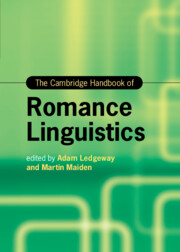Book contents
- The Cambridge Handbook of Romance Linguistics
- Cambridge Handbooks in Language and Linguistics
- The Cambridge Handbook of Romance Linguistics
- Copyright page
- Dedication
- Contents
- Figures
- Tables
- Contributors
- Abbreviations
- 1 Data, Theory, and Explanation: The View from Romance
- Part One What Is a Language?
- 2 Origins of Romance
- 3 Documentation and Sources
- 4 Variation in Romance
- Part Two Phonetics and Phonology
- Part Three Morphology
- Part Four Syntax
- Part Five Semantics and Pragmatics
- Part Six Language, Society, and the Individual
- Index
- References
3 - Documentation and Sources
from Part One - What Is a Language?
Published online by Cambridge University Press: 23 June 2022
- The Cambridge Handbook of Romance Linguistics
- Cambridge Handbooks in Language and Linguistics
- The Cambridge Handbook of Romance Linguistics
- Copyright page
- Dedication
- Contents
- Figures
- Tables
- Contributors
- Abbreviations
- 1 Data, Theory, and Explanation: The View from Romance
- Part One What Is a Language?
- 2 Origins of Romance
- 3 Documentation and Sources
- 4 Variation in Romance
- Part Two Phonetics and Phonology
- Part Three Morphology
- Part Four Syntax
- Part Five Semantics and Pragmatics
- Part Six Language, Society, and the Individual
- Index
- References
Summary
Until relatively recently, knowledge of the history of Romance languages was based on written sources. Writing traditions are usually conservative and rarely reflect more informal and sociolinguistically lower registers. Nonetheless, one must acknowledge the important function of written documentation in the understanding of a complex, multi-faceted, but partly inaccessible linguistic reality: a careful and circumspect use of written sources remains the main path for a critical interpretation of the linguistic facts of the past, together with historical-comparative reconstructions. From the first century BCE, there was an increasing diaphasic differentiation in the Latin-speaking world between a formal register and an informal one, so called ‘vulgar (or Late) Latin’. Deviations from norm often expose the linguistic structures of the emerging Romance languages, the earliest attestations of which date back to the ninth–tenth centuries and show a clear awareness of the difference between Latin and Romance. From the twelfth–thirteenth centuries, some areas began to codify certain scriptae which, despite their importance, present several linguistic problems. In the second half of the nineteenth century, dialectological studies acquired an important role, leading to dialectometry and scriptology, the latter at the crossroad of geolinguistics and corpus-linguistics.
Keywords
- Type
- Chapter
- Information
- The Cambridge Handbook of Romance Linguistics , pp. 123 - 149Publisher: Cambridge University PressPrint publication year: 2022

